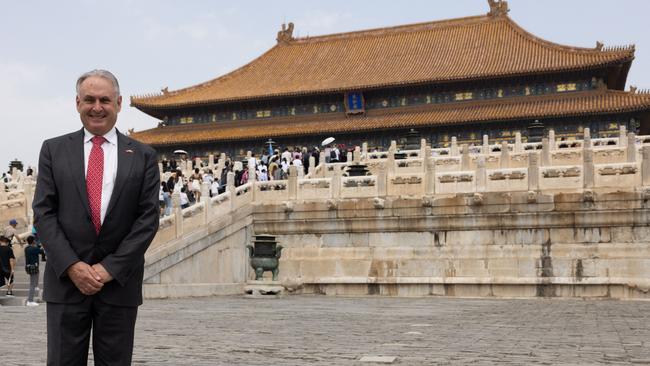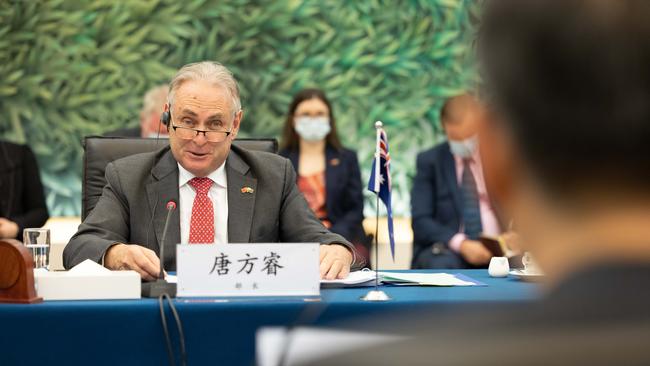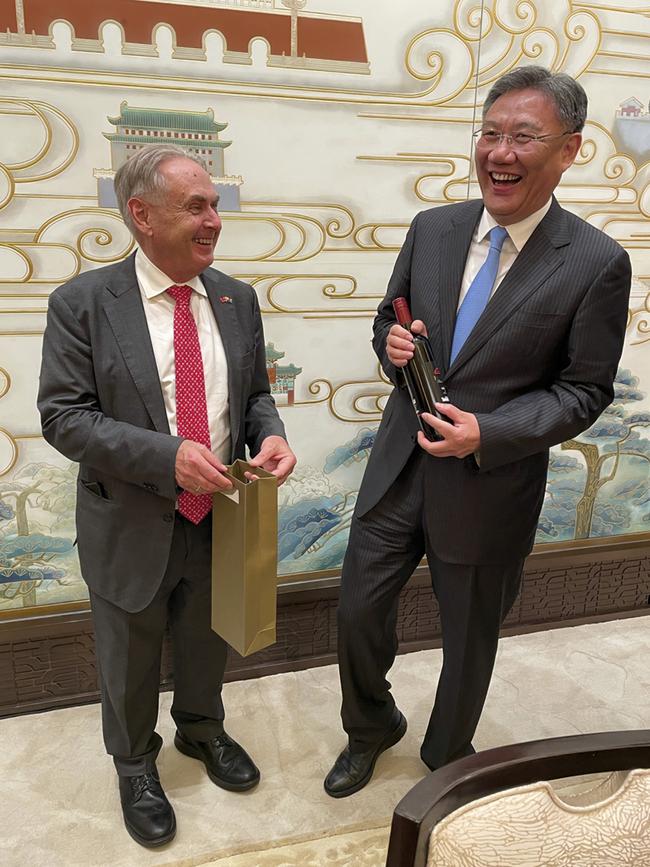Trick of the trade? China ‘ramping up the pressure on Australia’
The truth is we don’t know when — or even if — China will remove tariffs and imposts on Australian imports.

It is a pointed reminder of the gulf between China’s talk and Australia’s reality.
Ahead of Don Farrell‘s two-day trip to Beijing, speculation was rife that Australian live lobsters would be again allowed to legally enter what had been their dominant market.
In January, China’s top diplomat in West Australia visited Geraldton Fishermen’s Co-operative. Rumours raced around the industry: were the fat years about to return?
Five months on and not only has the unofficial black-listing not ended – China’s customs officials have clamped down on what had been a roaring illicit trade smuggled through Hong Kong and Taiwan.
“They are ramping up the pressure on Australia,” says one senior figure in the lobster industry.
There have been some boosterist predictions, but the truth is we don’t know when — or even if — China will remove the full range of tariffs and imposts on Australian imports previously worth more than $20 billion a year.

Many of the South Korean exports caught up in Beijing’s 2016 THAAD tantrum remain banned.
Australian coal has been allowed back, but ending it was hardly an act of charity. It was the biggest part of China’s coercion campaign — and the one that most obviously backfired. The ban put a huge cost on China’s steelmakers and, according to China-based energy analysts, contributed to at least two huge blackouts.
An unofficial ban on copper has also ended, although you might not have noticed it ever started. China doesn’t pay a premium on copper, so it had next to zero impact on Australian producers. It seems to have been allowed to trade again ahead of Trade Minister Farrell’s visit to send a “positive signal”.

The visiting Australian minister’s tour of the Forbidden City continued the charm offensive. He was even lucky enough to not be followed around that magnificent UNESCO listed site by two plain clothes security agents, as happened to me when I last visited in June 2020. It’s a different country if you have journalist (“jizhe”) stamped in your passport.
The key banned products discussed on Friday by Senator Farrell and China’s Minister of Commerce Minister Wang Wentao were lobster, timber, barley and wine.
Senator Farrell was told Beijing’s review of its 80 per cent tariff on Australian barley was “on track”.
He made it clear that Canberra wants an end to China’s more-than-200 per cent impost on Australian wine. Like barley, it is the subject of a case in the WTO.
The outlook for lobsters and timber, two China-dependent industries roiled by Beijing, remain in the hands of the Chinese gods, or rather, Xi Jinping.
Farrell left upbeat: “I achieved what I came here for — to find a pathway to resolve the remaining trade impediments.”

If normal market access is returned, the Albanese government will deserve much praise, but we should hold the applause until the Chinese follow through.
China’s Foreign and Commerce Ministries were upbeat and respectful in their remarks about the visiting Australian minister. That is a welcome change.
But the Global Times was less soothing: “China has no interest in changing Australia‘s foreign policy, which views the US as its closest ally. But its following of the US to see China as a security threat and crack down on China is not what we can turn a blind eye to. This is the root cause why China-Australia relations encountered difficulties.”
The party-state mouthpiece pointed to Australia’s AUKUS deal to acquire nuclear-powered submarines, which it described as a military plan to “contain and provoke confrontations with China”.
“How could Australia play the dual role as China‘s close economic friend and strategic security enemy at the same time?”
That question looms over all Australian businesses engaged in China. So do Beijing’s recently enlarged anti-espionage laws.

Fortunately for Australia, most of our exports to China are in strategic resources (iron ore, LNG, lithium, etc), which Beijing can only block at great cost to itself. It’s why Australian exports to China hit a record $180b in 2021, despite Beijing’s trade coercion campaign against the Morrison government.
Almost 90 per cent of that record loot were minerals, fuels and gold: an enviable profile when you are selling to a giant customer with a predilection for trade warfare. But it’s no comfort for Australian farmers, the most exposed to Beijing.

Our farmers have had some recent good China news in addition to the Trade Minister’s trip. Canada’s relationship with China keeps getting worse.
Beijing has threatened “strong reactions” after Ottawa last week revoked the credentials of a Chinese diplomat caught up in a foreign interference scandal. Canada, a fellow US ally and agricultural powerhouse, exports many of the same goods to China that Australia does.
Its fishermen have been one of the biggest beneficiaries of China’s Australian lobster ban. Might that be reversed?
“The Chinese are very good at manipulating,” observes a lobster exporter with decades of experience selling to our biggest trading partner.
If their fat years do return, our lobster exporters may owe Justin Trudeau nearly as much thanks as the Albanese government.


To join the conversation, please log in. Don't have an account? Register
Join the conversation, you are commenting as Logout